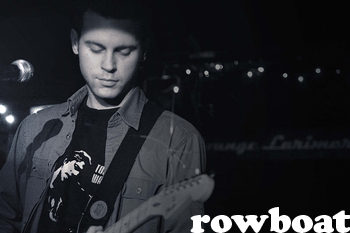




I understand my human experience in so much as I understand music. In fifteen years, I may not be able to name you the year where I became an uncle, lost my job, had my heart broken, officiated a wedding and had a friend die – all in a six weeks. But what I will be able to tell you is that this was the time when I was listening to Rowboat. Revealed as a side-project for Blue Million Miles (BMM) frontman Sam McNitt, Rowboat is more of a personal project. Casually McNitt will talk about Rowboat as being a conglomerate of songs he has carried with himself that weren’t right for BMM. But honestly, this is his constant personal project, a historical novel of his life – spanning years before his pride and joy, BMM, ever began. McNitt’s Rowboat recordings are some of the saddest songs I’ve ever known. True, my love affair with this musical project has been in conjunction with a heavily emotional period of my life. Certainly it’s no surprise that I saw every dark crease embedded in McNitt’s memorable lines (some that I mistranslated), but more than that: Rowboat served as the beautiful bully, the one that pulled everything out of my body, with a force and grace that I was grateful for. Having begun playing music in college, McNitt also began learning how to record. Through playing nightly with friends Jeff Shapiro (of BMM) and Grant Olsen - who went-on to form the Seattle act Arthur & Yu, McNitt began developing his sound – vocally and instrumentally. Unlike BMM, Rowboat has primarily been an acoustic act. McNitt recorded most of the parts himself, playing most of the arrangements. And like his role in BMM, McNitt is a true songwriter. In this, his process is personal and his final product is about the process. And that process is always about the human condition of being a meaning-making machine. Of churning what comes to the surface into a melody, or simply lacing together the melodies of his life: both what is immediate and what wells to the surface after deliberate concentration. McNitt’s ability to set arrangements within its hometown musical landscape is adroit. His swells of percussion and finger picking often lead to paradises of strings and swirling light. In none of 15 tracks that I was afforded by McNitt, was there anything that felt forced, or even tight. If there is a trademark to his work, it is in his spaciousness, the half-lidded dreamy world of love and theft that is tangled with back roads and main streets littered with bottles of booze and girls of the past. Always, always somebody is leaving, moving, roaming. In this, there is certainly an emotional heft to McNitt’s Rowboat project. Still constructing the project live, Rowboat has always played second string to working with players from his primary act. McNitt even admits that he didn’t intend on sharing much of this work with anybody in public. These were the songs that he played by himself, on his couch; after work and when nobody else was around. But now it seems that McNitt may be turning a corner. Now he is seeking a steady set of players and a consistent band of arrangements to accompany him when playing live. Up until this point, for a show, McNitt has grabbed whomever he could to help fill the show with him. For McNitt Rowboat is not contingent on working with anybody apart from himself. As a result, he has found the process of creating Rowboat songs a bit simpler. Because the onus is on him, if anyone at all. And more than that this project has afforded him a space to critique his work. Become a fan of it. Find its flaws and find its beauty – in a way that when working in a band one might find more impositions to. And while Rowboat is mostly an acoustic project – McNitt does play-out with his hollow body electric. And several of the recordings utilize some spacious electric guitar work in conjunction with his often-haunting vocals. In all of the recordings there is a consistency, but there is also one surprising outlier: a danceable, playful track that bounces with frothy rhythm. If Rowboat was the soundtrack to my days this summer, I have no doubt that he can create the score for others. And soon, by playing out more and recording more – McNitt’s second chair project may just move to the fore – as an exhibition of his life history. Of everything he has learned and wound into one great boat, heaving on the choppy seas of existence. Stay in touch with Rowboat’s future fate on the watery winds of musical expansion, here: www.myspace.com/rowboat. |









